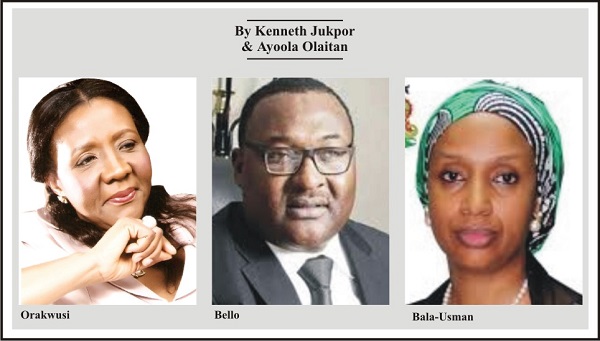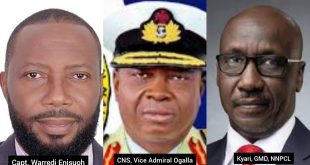
By Kenneth Jukpor & Ayoola Olaitan
The COVID-19 pandemic has brought the globe to a standstill for over two months, economic hardship has been recorded across several nations and continents, families have been separated and many engulfed in trepidation. However, in Nigeria’s maritime sector, this same pandemic has brought about unprecedented unity among government agencies.
Research shows that developed nations have learnt to attract more investments by getting its critical agencies to collaborate rather than compete in matters of national interest.
However, the myopic and egoistic trend of self-centeredness has robbed many African nations of the gains of such pertinent collaboration and Nigeria has found itself in such unpalatable state especially at the nation’s port sector.
Over the years, Nigerian Maritime Administration and Safety Agency (NIMASA) had feud with the National Inland Waterways Authority (NIWA) over removal of wrecks and boundaries on the nation’s waters. Nigeria Customs Service (NCS) has its fair share of battle with the Quarantine Service, Nigerian Police and National Drug Law Enforcement Agency (NDLEA); Standards Organization of Nigeria (SON) has contended severally with the National Agency for Food, Drug Administration and Control (NAFDAC).

The rip-off between the Nigerian Ports Authority (NPA) and Nigerian Shippers’ Council (NSC) especially on the crucial amendment of the concession agreement of terminal operators in the port sector, has also been highlighted.
The Council for the Regulation of Freight Forwarding in Nigeria (CRFFN) also seems to be at loggerheads with NPA over the allocation of port pass to freight forwarders, a role CRFFN considers as the thrust of its obligation.
Despite these differences, during the lockdown maritime agencies were able to collaborate under a body known as Maritime Task Team to address crucial port sector issues with national interest as the crux of the union.
It was a union not compelled by the Minister of Transportation, Hon. Rotimi Amaechi whose supervisory role and Ministerial activities usually see the agencies come together by compulsion.
Although the Maritime Task Team was created at the instance of Shippers’ Council, it was headed by the Registrar of CRFFN and it had membership from NPA, NIMASA, and other agencies and stakeholders at the ports.
The collaboration of these agencies was also observed when they made donations to ease the burden of port users amid the lockdown. While NSC provided buses, CRFFN arranged for the security personnel on these buses. NIMASA availed interceptor boats for tackling the pandemic via waterways. NPA was quick to direct terminals to issue waivers via free storage period and NSC later followed this fine lead with similar directive to shipping lines.
NIMASA extended certificate validity for seafarers, while NPA announced rebates for compliant terminal operators. CRFFN engaged the Inspector General of Police to direct Lagos officers to stop victimization of freight agents heading to ports for their businesses. NSC reached out to banks to begin operations at ports despite the lockdown to facilitate cargo evacuation.
These altruistic activities are too numerous to conclusively itemize, but they were duly appreciated by the port stakeholders and gains were felt across the nation.
A representative of the Nigerian Association of Chamber of Commerce Industry, Mines and Agriculture (NACCIMA) Mrs. Margaret Orakwusi couldn’t hide her excitement on this as she said, “In a way what has happened in this period has made most of our agencies to be efficient in their usual duty. I must commend the Shippers’ Council for bringing all the agencies together to work under the Maritime Task Team for COVID-19”
Orakwusi observed that operators in the private sector have been dismayed at the unhealthy rivalry among the maritime agencies.
“We have always wanted this unity to happen because we also realize the overlapping functions of the different agencies. Prior to this time, it kept them working together as every one had a personal agenda and a lot of jealousy. This lack of unity affects those of us in the private sector. So, we thank you for doing this and we hope it continues because when you come together you can recognize your overlapping functions and address them.”
She also noted that some private operators have seen their businesses suffer severely as a result of the egoistic operations of different agencies, noting that goods have been delayed because one agency wants to inspect items already checked by another agency.
Laudable initiatives for the port sector such as Single Window, Cargo Tracking Notes (CTN), Maritime Security technology, among others have suffered as a result of this problem of unhealthy rivalry among agencies at the ports.
Highlighting this important role while speaking on the recent review of terminals concession agreement, the Chairman, Bayelsa and Rivers Shippers Association, Mr. Ofon Udofia said; “Shippers are appealing to NPA to put on hold that agreement because there were several flaws in the initial agreement. A proper agreement would require stakeholders input to highlight these flaws and proffer solutions”
He posited that the maiden agreement had provision for an economic regulator even though there wasn’t one at that time, therefore, he appealed to NPA to avail Shippers’ Council the reviewed document to study and make input on economic aspects such as tariffs and rates.
This position on collaboration was also highlighted by the President of Africa Association of Professional Freight Forwarders and Logistics on Nigeria (APFFLON) Mr. Frank Ogunojemite who told MMS Plus that port terminals and shipping companies were able to ignore federal government directive for wiaivers during the lockdown because NSC and NPA weren’t pulling their weight together.
According to him, if both agencies had issued a joint statement on the waivers, the response from the terminal operators and shipping companies would have been instantaneous and positive.
He admonished the Minister of Transportation, Amaechi to intervene in a bid to get all port agencies on the same page with national interest especially on crucial aspects such as port concession agreements that would affect Nigerian shippers, NSC, freight forwarders, Customs, other stakeholders.
“This obvious tussle for power and influence in the port sector is uncalled for. NPA should realize that it would subject the nation’s port sector to numerous challenges that would have been highlighted if stakeholders were given an opportunity to make input in the review,” he said on the port concession review.
Although the Transport Minister, Hon. Rotimi Amaechi has said severally that he wouldn’t want such disharmony under his ministry, this problem persists.
One of the major challenges to growth in Nigeria is that, rather than work together to share ideas and technology for the good of the nation, most organizations as well as individuals choose to see themselves as unhealthy competitors.
As the COVID-19 pandemic has brought maritime agencies together with unity of purpose, port stakeholders and the nation have seen that such harmony isn’t a mirage. It could actually work if all parties decide to shelve their differences and put the nation first.
By collaborating with different departments or even different offices, skills can be harnessed to make the project more successful than it might otherwise be. Organizations within a community or sector achieve more when they collaborate with other agencies as they pull resources to achieve the same goal.
Today, collaboration among organizations, individuals and nations is considered sacrosanct and it has become very important in the world as a modern trend everywhere but Africa and Nigeria in particular.
It is time to correct this misnormer at Nigeria’s port sector and the nation at large, agencies can and they should work together for the good of the nation.
 MMS PLUS NG – Maritime, Aviation, Business, Oil and Gas News Online Newspaper with coverage in Maritime, Oil and Gas, Aviation, Power and Energy as well as Financial News
MMS PLUS NG – Maritime, Aviation, Business, Oil and Gas News Online Newspaper with coverage in Maritime, Oil and Gas, Aviation, Power and Energy as well as Financial News









